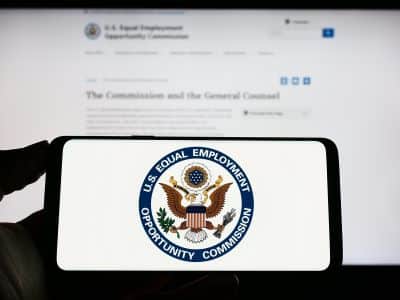With the departure of Equal Employment Opportunity Commission (EEOC) Commissioner Keith Sonderling (R), the Democrats on the Commission have a 3 to 1 majority. It’s unlikely this change will make any difference for the remainder of President Joe Biden’s term, but things could change after President Donald Trump takes office.
EEOC Has Received Nearly 2,000 Charges Under PWFA
The EEOC has received 1,869 charges from employees alleging their employers failed to provide accommodations required by the Pregnant Workers Fairness Act (PWFA) as of September 11, 2024. According to EEOC General Counsel Karla Gilbride, most of the charges involve employers refusing to provide or delaying accommodations by unnecessary medical documentation, and that is the case with the first PWFA lawsuit filed by EEOC.
Although the EEOC’s PWFA regulations require employers to provide reasonable accommodations for employees’ abortions, Gilbride wasn’t aware of any charges being filed with the EEOC over failure to accommodate abortions. Instead, most charges involve employees being denied “basic, common sense” accommodations such as water breaks, places to pump breast milk, and permission to come in late because of morning sickness.
Also on September 11, the agency announced its first lawsuit under PWFA against Wabash National Corporation for failing to accommodate a pregnant employee’s request to transfer to a position that didn’t require her lying on her stomach. It also announced its first PWFA settlement of $47,000 with ABC Pest Control for firing an employee who sought time off to attend monthly medical appointments.
EEOC Issues Report on Underrepresentation in Tech
On September 11, 2024, the EEOC issued a report, High Tech, Low Inclusion: Diversity in the High Tech Workforce and Sector 2014-2022, which reflects that employees in high tech as well as non-tech jobs within the technology sector are less racially and ethnically diverse in 2022 when compared to minority representation in the total U.S. workforce. While workers of color represented 40.1% of employees in high tech jobs in 2022—which was an increase of 32.4% over 2014—Black employees in tech only increased to 7% in 2022 from 6% in 2005, while the number of Hispanic employees doubled to nearly 10% from 5% in 2005. The number of women in tech has not increased at all, remaining at 22%, with only 4% in the high tech sector despite the fact that women represent over 47% of the workforce. Finally, the number of employees 40 and over in high tech workplace has declined between 2014 and 2022 from 55.9% to 52.1%.
The report’s findings state that the above cited underrepresentation is because of “discriminatory barriers” and that the agency intends to proactively investigate discrimination charges as well as litigation. Tech employers should expect a surge of enforcement action in areas where a majority of charges have been filed, including retaliation, disability discrimination, and race and sex discrimination particularly.
PWFA Regulations Challenges Continue
Seventeen Republican state attorneys general (AGs) in State of Tennessee et al. v. EEOC have asked the U.S. 8th Circuit Court of Appeals to revive their lawsuit against the EEOC challenging the abortion-related portions of the PWFA. Federal District Court Judge D. P. Marshall Jr. had denied their request for a preliminary injunction and dismissed the lawsuit for lack of standing.
The state AGs had argued that the regulations would require them to either “facilitate workers’ abortions” including “elective abortions of healthy pregnancies that are illegal under state law,” or face a federal lawsuit. They claim the regulation’s requirement that states accommodate employee abortions contravenes state law and is sufficient to show standing. They also argue the lower court relied on Chevron deference, and as a result, the appeals court should exercise its independent judgment to determine whether the PWFA authorized the abortion-accommodation mandate in its regulations.
In addition, a Catholic employer organization in North Dakota sued the EEOC to block both the PWFA regulations and the agency’s harassment guidance, arguing its members faced the threat of agency action over refusal to accommodate abortion and infertility treatments as well as preferred pronouns and access to facilities based on gender identity.
Recent Large Construction Settlements
The EEOC received two large settlements for severe racial harassment by construction companies.
J. A. Croson agreed to pay $1.6 million to 17 individuals to settle claims of racial harassment and retaliation based on racial harassment. J.A. Croson will provide an employee relations hotline for employees to submit harassment and retaliation complaints, assign an investigator to receive and address harassment and retaliation complaints, and provide training to its employees on recognizing workplace harassment. The company will also conduct work environment surveys and audits to ensure race and national origin don’t play a role in the delegation of work assignments.
Asphalt Paving Systems agreed to pay $1.25 million to settle claims it subjected Black employees to degrading and humiliating conditions. The company will provide specialized training on race discrimination to prevent workplace discrimination and how to address complaints and will appoint an outside monitor to review complaints of race-based harassment. It will also provide the EEOC with reports of harassment complaints.
H. Juanita Beecher is an attorney with FortneyScott in Washington, D.C. You can reach her at nbeecher@fortneyscott.com.
The post The EEOC Has a 3-1 Democratic Majority appeared first on HR Daily Advisor.
